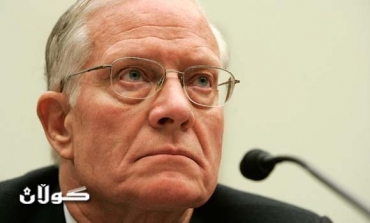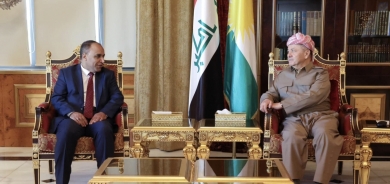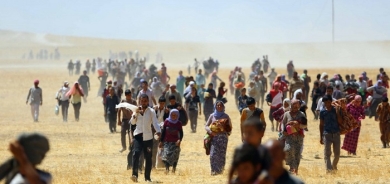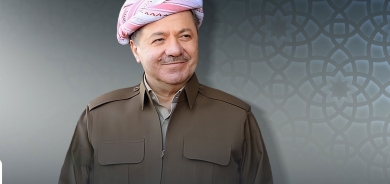Anthony H. Cordesman to Gulan Magazine: The power struggle in Iraq taken different forms, and this is a crippling problem
February 14, 2012
Exclusive Interviews

The Professor Anthony H. Cordesman holds the Arleigh A. Burke Chair in Strategy at (Center for Strategic and International Studies – CSIS). He is a recipient of the Department of Defense Distinguished Service Medal. During his time at CSIS, he has completed a wide variety of studies on energy, U.S. strategy and defense plans, the lessons of modern war, defense programming and budgeting, NATO modernization, Chinese military power, the lessons of modern warfare, proliferation, counterterrorism, armed nation building, the security of the Middle East, and the Afghan and Iraq conflicts.The Professor Cordesman has directed numerous CSIS study efforts on terrorism, energy, defense panning, modern conflicts, and the Middle East. He has traveled frequently to Afghanistan and Iraq to consult for MNF-I, ISAF, U.S. commands, and U.S. embassies on the wars in those countries, and he was a member of the Strategic Assessment Group that assisted General Stanley McChrystal in developing a new strategy for Afghanistan in 2009. He frequently acts as a consultant to the U.S. State Department, Defense Department, and intelligence community and has worked with U.S. officials on counterterrorism and security areas in a number of Middle East countries.He is the author of a wide range of studies on energy policy, national security, and the Middle East, and his most recent publications include (CSIS, 2010), Iraq and the United States: Creating a Strategic Partnership (CSIS, 2010), Saudi Arabia: National Security in a Troubled Region (Praeger, 2009), Iranian Weapons of Mass Destruction: The Birth of a Regional Nuclear Arms Race? (Praeger, 2009), Withdrawal from Iraq: Assessing the Readiness of Iraqi Security Forces (CSIS, 2009), and Winning in Afghanistan: Creating Effective Afghan Security Forces (CSIS, 2009).We contacted the Professor Cordesman to discuss the current situations in Iraq, and he responded to our questions in an exclusive interview to Gulan Magazine as the following:
* The complicated situations of Iraq is leading the country to violence and civil war again, because as you see the Sunnis withdrew from the political process, the Sunnis representatives returned back to the Parliament but they didn’t go back to the Iraqi council of ministers. In your view; to what extent do you believe that Iraq is in danger if it headed into instability?
- The problem is Iraq has never truly been stable; you have a high level of continuing violence, and the insurgency and civil conflict that lasted until 2008. But when you look at the statistics on Iraq, they are actually as more are violent in terms of the number of victims in Iraq than the numbers in the war in Afghanistan, and both countries have the same size and population. You really had not seen stable government in Iraq before the election in 2010. The power struggle which began before the election have taken on different forms, and certainly in the last few months they become far more serious, but you never had a period in which people could concentrate on actually governing Iraq well, meeting the needs of its people, and creating an effective security. And this is then a crippling problem, at this point of time; where the primary threat Iraq faces is not a group of insurgency or extremists, it is its own political leaders.
* Many observers believe that in order to normalize the situations in Iraq, the Sunnis and the Shiites shall cooperate and have dialogue, but as you may see the Iraqi Prime Ministers refuses dialogue. In your view; how far do you think that declining dialogue complicates the situations, and what are your recommendations to the Iraqi leaders?
- I think we need to be very careful not to say that one side of this is at wrong. Over the months since March 2010 both sides have been far to interested in their own ambitions and far to address the needs of the Iraqi people. But clearly there is need for compromise between Iraq’s Sunni and Shiites’ leaders. There is a need for cooperation between Iraq’s Kurds and Arabs and its minorities. Above all of this; you need the central government to focuses on security and development and not on the ambitions of the individual leaders. Now how you get a dialogue and compromises to do this? It is not that someone on the outside can give you detailed advice. But I think the call here is not simply for dialogue. Iraq simply can not afford to have elected senior officials that do not seem to care about effective government, the security of the people, and economic development and economic well-being. And what you see from the outside is a level of personal ambitions and selfishness that threatens not only the nation’s future but all the people in Iraq.
* Many experts believe that the United States shall relay its supports to Iraq for the Iraqi government in order to show “Soft Policy” on the internal affairs’ level. In your view; do you think the United States can put pressure upon the Iraqi government through supporting Iraq?
- Well; the practical problem is this: the United States has put pressure on Iraq continuously since the elections, and indeed it attempted even before the elections to convince people that regardless of the outcomes they would have to work together. But the fact is that the Unite States does not have at this point any authority to intervene or pressure Iraq. And the level of aids the United States is providing are not going to be sufficiently high so they can somehow be used to convince Iraq’s political leadership to work together. This is a kind of a situation where not only the United States but many other countries that tried to get compromises, and the UN has made few efforts to get Iraq’s political leaders to work together. But those efforts by themselves are not going to succeed; this is an Iraqi problem which can now only be solved by Iraqis.
* Do you think that Kurds can play positive role in normalizing the situation?
- I think the Kurdish leadership has played a positive role. And I think it is important that Kurdish leaders have attempted to create a functioning and settled compromises in the working relationships between the various Sunni and Shiite leaders, because the fact is that there is no alternative, at least in the near future, to keeping Iraq united. Its infrastructure, its energy resources, and dealing with its neighbors really require Iraq to work together, and I think the Kurdish leaders have so far played a major role in moving toward that objective.
* Local experts think that the “National Conference” is the only chance for the Iraqi political crisis to be solved, and they think that in case Iraq failed to solve the issues through dialogue then Iraq will turn into a failed state. According to your opinion; in case Iraq turned into a failed state, then how far do you think that it will influence the regional stability and the US interests in the region?
- Certainly Iraq is critical to regional stability. Iraq is a major force in the Gulf; Iraq can play a critical role in insuring the security and the stability of the Gulf but only if Iraq has an effective and unified leadership that is capable of moving the country back toward development and security. The caution I would give you is; the conferences and dialogues are meaningless unless the people who attending are willing to compromise and are willing to workout relationships which actually can function. And in many ways this is something that should have happened without any conferences or formal dialogue more over than a year and a half though. It is not a matter of holding meetings; it is a matter of whether Iraq’s top leaders will put the country first.
* Last Question: Other experts believe that; if the situation in Iraq continues this way, then Iraq will become a field for international intervention in particular Iran’s influence in Iraq which seems to be increase. In your view; to what extent do you believe that this situation will lead to the Iranian influence to increase in Iraq? And also; do you think that Iraq will be partitioned into different states?
- I think one needs to be very careful. If Iraq is too weak, even weaker than it is now; certainly Iran influence over the Shiites would become far stronger if they had nowhere else to turn to. And almost inevitably; the Sunnis will turn to the Arab Gulf States. The Kurds would have to find some balance between Iran, the Arab Gulf States, and Turkey, hopefully with the aids from the outside. But the fact is that Iraq can’t function as a divided country, because of the way its water resources and energy resources work. It is easy to talk about dividing a country, but the moment you actually try to do this in practice you can see what would happen. Iraq is unique and is independent in terms of the overall-flow of oil revenues; no other country in the Gulf has that same dependence on the state sector on petroleum resources, on allocating these resources to its people on a broad level. It is also clear that a weak and a divided Iraq would be basically so vulnerable to pressure form its neighbors, that is would be very unclear what any of those many states could actually do. And that’s very different from strengthening individual provinces, creating something approaching in a more federal system, giving the provinces and cities more authority and ability to control their own future, and dividing the resources of the country out of the central government control. That type of efforts might have positive effects, if the Iraqis could agree on a compromise. But a divided Iraq in the form of many states; is an Iraq too weak to function and survive.
Transcription: Qane’ Kakeiy















